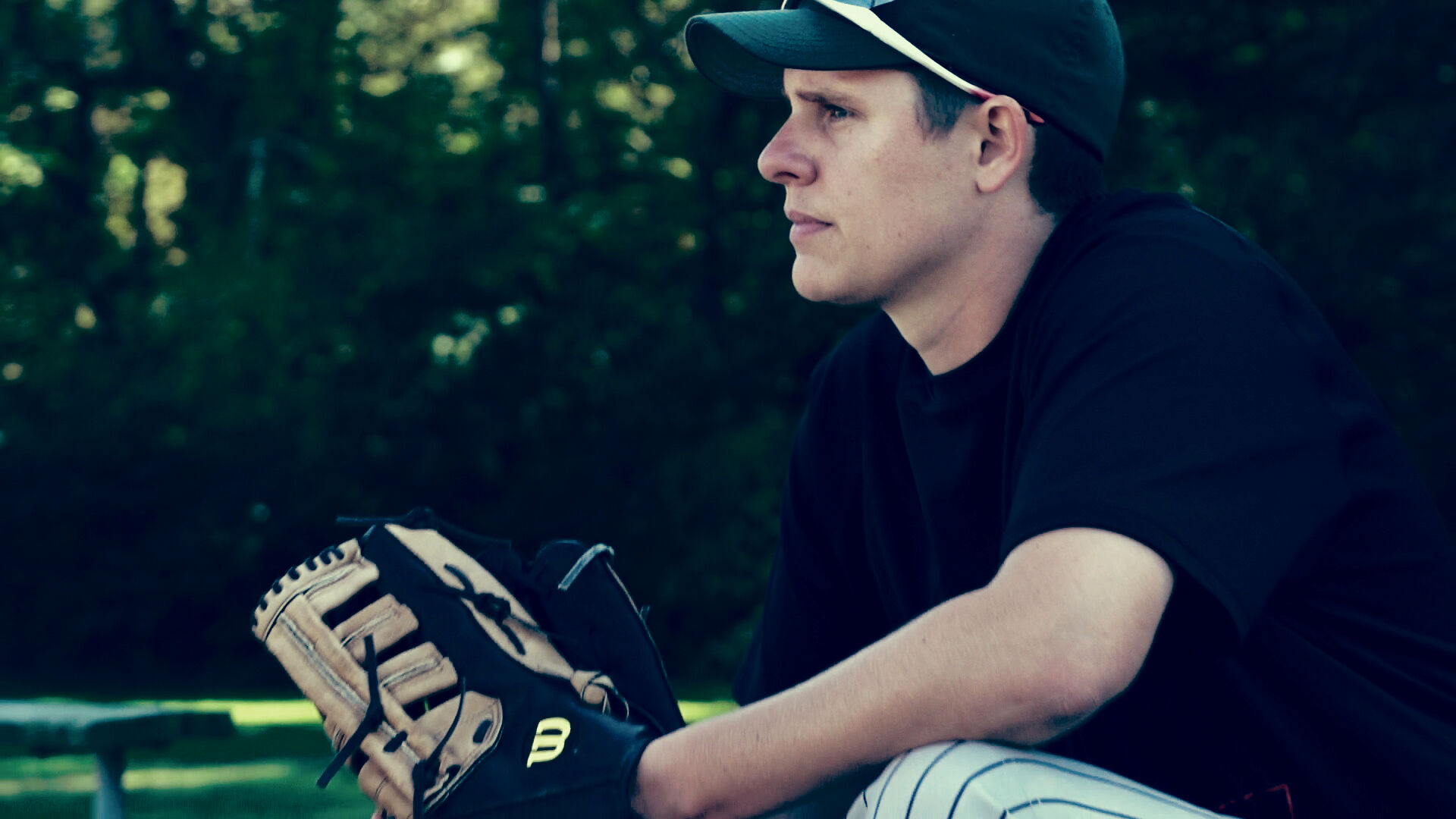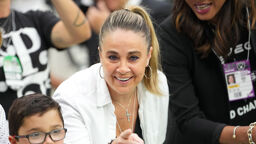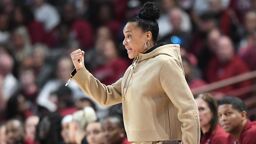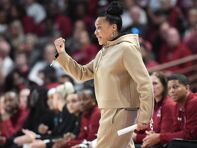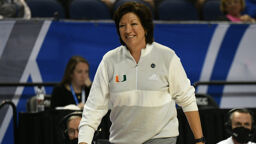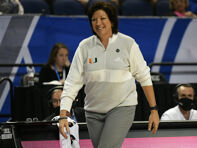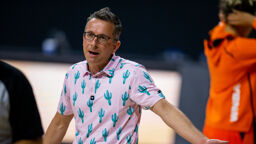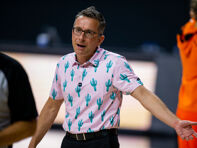Inside the Ponaganset High School gymnasium in rural Northwest Rhode Island hangs a banner commemorating the school’s basketball players who racked up more than a thousand points in their careers. Included are only about a dozen names, dating back to the ‘70s.
Seeing the banner hits Stephen Alexander in the gut every time.
Alexander was a standout baller for the Chieftans in the mid-‘90s. He won four straight state championships playing for the school. He was voted MVP of tournaments and was named to the All-State Basketball First Team. He loved basketball and the fans loved him. And yes, he scored more than a thousand career points.
In its place is another name, one given to him at birth by his parents. It’s a name to which he feels no connection.

Yet his name isn’t on that banner. In its place is another name, one given to him at birth by his parents. It’s a name to which he feels no connection.
“I see Jen up on there,” Alexander said standing outside the high school that holds so many memories, “but I never saw myself as Jen.”
Alexander played for the Ponaganset girl’s basketball team under a different name at a very different time in his life. He is part of a small transgender minority in our culture. With so many trans people migrating to the cities, his home in small-town New England makes him even more of a minority. With this article, he becomes a minority of one: the first high school coach to come out publicly as transgender.
He’s walked into that gymnasium a lot since moving back to his hometown three years ago. Sometimes it’s been to support his old high school team as they take aim at another state title. Often, it’s on the way to practice; Alexander has coached five different sports, at his old school and other schools in the area, over the last three years. This month he wrapped up his high school boy’s soccer season and started tryouts for the middle school boy’s basketball team.
Yet every time he sees that banner — while it signifies a great accomplishment in his life — it’s a reminder of how some people in the town see him. The name emblazoned on it is a relic of his past. And it’s an indication of the importance for him to generate conversation with this groundbreaking step out of the closet in rural America.
“I love my family and my friends,” Alexander said as we talked after a varsity boy’s soccer practice in early October, the foliage transitioning seasons around us. “And that’s what’s going to really get me through, the support network and the people willing to engage in dialogue that’s healthy and isn’t judgmental.
“That dialogue is what is divinity.”
* * *
Alexander lives in Glocester, R.I., a small town in the smallest state in the union. The Chepachet village center where he calls home is one street with a church, a country store, a couple businesses, the fire department and a library.
It’s the last place on earth most would expect to find a thriving transgender coach.
It’s the last place on earth most would expect to find a thriving transgender coach. Set on the outskirts of Providence over an hour away from Boston, the quaint town of fewer than 10,000 people, with its rolling hills and plush farms, harkens back to a simpler time.
“We live in a predominantly white community where we don’t have a lot of diversity,” Heather Sherman, Alexander’s only sister, said. “There haven’t been many instances in this community where people had to accept diversity.”
According to the U.S. Census, Glocester is over 98 percent white.
It’s been hard for many in the village to accept much change at all. Alexander’s old gym teacher, Dave Chace, said he’s a moderate-liberal Democrat surrounded by conservative “super Republican strongholds.”
“It’s the old Yankee mentality,” he said. “They’re very conservative, they like things how it used to be with very little change. They don’t want to tear down the old buildings or see modern things come in.
“CVS did put in a drive-thru, and boy they had to jump through hoops to get that drive-thru in town.”
Alexander knew he was a boy when he was five. He eschewed Barbie dolls and My Little Pony, instead playing with Go-Bots and G.I. Joe, making mud pies by the lake where he lived since birth. He shunned dresses and skirts, opting for pants and — unique to him on his girls teams — turtlenecks under his uniforms.
“He was very uncomfortable as a girl,” his mother, Linda Dandrow, remembered. Looking back at the signs, she wondered why she didn’t see it coming. “He often referred to his breasts as tumors. ‘Those are tumors on my chest, I want to get them off.'”
Even with the growing discomfort with his identity, the environment of the area kept him from fully expressing who he was. It was marginally acceptable to be a “tomboy” with short hair and pants; to be an actual boy was something Alexander thought would never be accepted.
It was in sports that he found his refuge from a very young age.
“Sports saved me,” Alexander said. “In dealing with life, it was something where I could step outside of myself and be part of something greater, rather than the introspective you have to do in order to survive.”
Sports is a big part of life in Glocester. To a large extent, the athletic teams of the middle and high schools define the town and drive the social scene. On the night of a big game at the school, it’s hard to find anybody not at the field or in the gym.
They’re also die-hard fans of New England sports. Less than an hour from Foxborough, this is Patriots Country. One evening after a campfire and some beers on the lakeshore, we headed into the house for a rousing Sunday Night Football game: New England at Atlanta. Friends from across the state descended on the big-screen TV in the living room. I picked the Falcons by 14. Alexander picked the Patriots by 7. He was spot-on.
When the Red Sox won their third World Series in a decade, Alexander cried having witnessed what he saw as a memorable bunch of players. They played, as he preaches, like a team.
“Sports are about working with people for a common goal,” Alexander shared. “It’s something larger than yourself. It’s education, it’s those ‘A-ha’ brilliant moments of improv. It’s the greatest theater there is, because it’s so unscripted. To see your teammates succeed, to see yourself part of a big moment, it’s fleeting, but it’s so exhilarating.
“I want more of that. I want other kids to do better, to think and to engage with each other. It’s magical.”
It was also in sports that his name became known across the state, even if that name is one he’d rather never hear again.
Coach Chace rarely held “girls versus boys” games in gym class. Every time he allowed it, the result was the same with the boys stomping the girl’s team.
The year Alexander played, things didn’t go as planned.
“The girls crushed the boys,” Chace remembered. “It was the only time that ever happened. And Jen was one of the girls on the team. She could not be stopped. She was aggressive, she was fast, she was strong. She wasn’t big, she was a nice, skinny little girl, but she just had an attitude like nobody’s going to beat me.”
Over the course of his high school career, Alexander’s teams won six state championships.
It was the attitude of a burgeoning superstar athlete. Over the course of his high school career, Alexander’s teams won six state championships. He was named the MVP of the state girl’s soccer final his freshman year. He won copious team and league MVP awards. He lettered in five varsity sports over his career: Softball, tennis, basketball, volleyball and soccer. And yes, he hit that thousand-point scoring milestone on the hard court.
“I don’t care about the MVPs and the All-State honors, even though they were great,” Alexander said. “It was more about the teams and what we were able to accomplish.”
His will to win fueled him. In one high school basketball game, he stole the ball with seconds left, drove the court and scored to pull out a win.
In sports, Alexander didn’t let anyone get in his way.
“He was very good,” his sister Heather said. “He was very competitive. At one practice, we actually got into a physical fight that led to him pummeling me in front of the team. That was our relationship then. It was his competitiveness. He meant business.”
As we watched the hometown Patriots play what, at the time, was their best game of the season, Alexander waxed about his signature aggression that made him so successful in sports. While the aggression of many dominant female athletes — like Serena Williams, Brittney Griner and Laila Ali — is well-documented, Alexander feels his aggression comes from having a male brain. That gave him an advantage — not an unfair advantage, just an advantage, like natural height or speed or strength — over some of the girls he competed against who sometimes didn’t seem to have the same fire as he.
With his dominance in high school sports, it would seem his induction to the Ponaganset High School Athletic Hall of Fame would be an open-and-shut case. The Hall of Fame was created three years ago to recognize the best in sports the high school has produced. This year, Heather nominated her brother for a place in the house of legends. The Hall of Fame committee received 20 nominations, of which they inducted eight people. Alexander was left off the list.
“When Heather found out I didn’t get in, I think she was more pissed than I was, almost insulted,” Alexander remembered. Given his résumé, it’s hard to see any reason for the snub other than his trans status. “I was upset. There’s no other way to put it. And I wasn’t shocked at the same time. People just didn’t seem ready. They said they were, but sitting behind closed doors with a group of people is different. I think the group itself was just not ready.”
* * *
Get off the sidelines and into the game
Our weekly playbook is packed with everything from locker room chatter to pressing LGBTQ sports issues.
Alexander left Northwest Rhode Island after graduating from Ponaganset High School in 1996. He attended nearby Stonehill College in Southeastern Massachusetts, where he played basketball on the DII women’s team.
After college, he had a choice to make. Still oblivious to the life-changing transition on which Alexander was about to embark, his family would welcome him back home — just down the I-95 and a short jaunt across the state — in Glocester. There, he’d find a simpler, familiar life with old friends and old relatives.
There were also old attitudes. Alexander knew something had to change, and that something was him. Feeling ever more trapped in the wrong body, he knew rural Rhode Island was not the place to make some big shifts in his life.
“If I didn’t transition, I would not be alive today.”
He moved to New York City where he found a blank canvas. In Glocester, he was surrounded by people who had known him for 20 years. They knew him by another name and another gender. In New York, he suddenly became whoever he wanted to be.
“Being in a small town and trying to transition is not the easiest thing,” he said, “so it was good to go off alone for a while, and meet new people in new places where I had a whole new identity to be who I was, where people would accept me initially from the get-go, rather than seeing me through what’s going on in their head.”
When he came out to his family from afar, it was desperately confusing to them. “Transgender” wasn’t even a vocabulary word taught in school. They had never heard of it. They were convinced the “girl” they knew was simply a lesbian, which they could understand. Some therapy, they assumed, would straighten him all out.
Instead, the therapy straightened out his family. It took years, but eventually they came to realize — with the help of a psychiatrist — that Alexander wasn’t a lesbian, and that one of the treatments for his situation was gender-reassignment surgery.
“One of the things [the psychiatrist] said was the brain is male and the body is female, and there is a disconnect,” his mother Linda said. “We always knew Jen had some body dysphoria, very conscious of body parts. A concern was, how do we know our child, when going from female to male, would actually be happy. I know they’re not happy the way they are now, but what guarantee is there that they’ll be happy on the other side?”
Ultimately, his parents accepted that he was transgender and that he wanted to get gender-reassignment surgery. Together they made the trip to New York City to be with their son for the procedure.
“I could not reject my child and let my child go through this alone.”
“The surgeon got up and he hugged me and he said, everything will be all right,” Linda said. “And he said 80 to 90 percent of the parents don’t come with their children. And I thought, ‘Boy, that’s a high statistic. How do parents not support their children?’ As a nurse, I could not reject my child and let my child go through this alone.”
Fully transitioned in his personal and professional lives, Alexander got the inkling to make another big change.
“It was time in life to come home,” he said. “It’s like baseball. You step to home plate in the batter’s box, and you’re able to hit the ball and run to first base. And I kind of look at first base as being in college. Life is that full cycle, and you come home, and you’re sliding into home, and you’re safe.”
How safe he would be back in Glocester was a big question.
“People are ignorant,” said Kristen Collins, who won state championships with Alexander in high school. “Not on purpose, not necessarily in a bad way, just because they’ve never been exposed to it. They’re afraid to have their own conversations with people. They’re afraid to learn about things they don’t understand. They think transgender is out there, that it would never hit home.”
Alexander and his family worried whether he would be able to find a job, or if their family friends would accept him.
One of those friends was George Boisvert. Boisvert had coached Alexander in several sports in elementary and middle school. The two families had grown close quickly in the mid-’80s, taking vacations together that included a road trip to the Rocky Mountains.
A card-carrying conservative Roman Catholic, Boisvert isn’t afraid to share his opinion, and politics is a hot topic. His wife warned as we sat down in their living room, “Don’t get him started on Obama.” Some trepidation on the part of Alexander and the Dandrows was warranted.
“When they told us about this change taking place, it was definitely a shock,” a now-retired Boisvert said in his own animated fashion. “It’s not an occurrence that normally happens in our lifetime. It’s not something we’ve come across before. It was something new, something different, something we just never thought of.”
The shock faded fast, and it didn’t take long for Boisvert to round out his occasional golf outings with some buddies — and the town’s newest resident. Alexander’s a likable guy, good at shooting the breeze and making folks feel at ease. He looks and sounds like your average straight guy from small-town Rhode Island, complete with accent and baggy pants.
Most importantly, he doesn’t slow down a foursome on the course.
“Just because she’s a he or he’s a she, it’s the same person.”
“When you don’t know the individual, you don’t know how to deal with them, how to accept them,” Boisvert said. “But once you know the person, then it becomes a lot easier to accept the process, the change. You know that person. Just because she’s a he or he’s a she, it’s the same person.
“The insides don’t change.”
The issue of LGBT inclusion came to a head recently in Glocester. As the state debated whether to legalize same-sex marriage, the minister of the Chepachet Union Church, smack in the center of town and home to a mix of Baptists and Congregationalists, wanted the church to take a stand against the gay lifestyle. He even brought in a book for the deacons to read about why the church should stand against the LGBT community.
Linda, a deacon in the church, was floored. She was already struggling to accept her son as a trans man, and the minister of her beloved congregation was vilifying members of the LGBT community. She debated what to do. Take a stand in front of all these other deacons and risk being ostracized by others in the church?
She didn’t have to debate long. Chace, Alexander’s gym teacher from years ago and another deacon in the church, stood up first. He wasn’t having any of it.
“I didn’t have to read the book,” Chace said. “I just believe in the Golden Rule, do unto others as you would have them do unto you. If somebody gay wanted to come to my church, it would be fine with me. If [the minister] didn’t want to marry two males or two females, that’s up to him. But I can’t see him telling us who to let in and who to not let in.”
One by one, other deacons stood up. That kind of discrimination wasn’t going to be allowed in a church whose sign on Main Street says, “All Welcome.”
It was an important lesson for Linda: She didn’t have enough faith in the members of her community. When presented with an issue that could have torn her from the church, the people around her leaned toward inclusivity.
Over and over, she has found the same support within the community for her son.
“They watched Stephen grow up from a little child to an adult,” Linda said. “They know the person. They know Stephen is caring, Stephen works hard, Stephen wants to do things, just like any other human being. He has the same feelings, the same concerns. He’s worked hard to get a good education. He has two master’s degrees. He’s not your average person. He’s worked hard to get where he is.”
The little village of Glocester, it seems, has had a transition of its own.
* * *
Alexander has already coached five different sports from middle school to high school.
After just three years back home, Alexander has already coached five different sports from middle school to high school: basketball, tennis, volleyball, soccer and baseball. He’s coached both girl’s and boy’s teams. He’s been an assistant coach and a head coach.
“Now he’s back and he’s coaching as a male in the system that he went through as a female,” said Alexander’s proud sister. “And people are soliciting him for coaching.”
Jamie LaRose is the girl’s basketball coach at Ponaganset Middle School, where Alexander coaches the boy’s team. The two work closely together, talking daily about strategy, sharing the gymnasium for practice. They’re currently building their rosters for the 2013-14 season.
“He’s taken some teams that have had a variety of different coaches in the past and a lot of turmoil, and he’s gotten them to a .500 record or better,” LaRose said. “I think he’s a great coach.”
LaRose said Alexander’s coaching style works great with the kids. He has a way of empowering them beyond their years. It’s not easy making 11-year-olds part of the decision-making process on a team, or teaching them true leadership skills. That’s Alexander’s forte.
“From what I hear from the kids, and the kids won’t lie to you, the kids like him,” said Gary Martinelli, Alexander’s AAU basketball coach in the mid-’90s. “And in high school, that’s what matters.”
At this point, most of the kids know at least part of their coach’s backstory. LaRose said many of the parents have asked her questions about Alexander’s gender identity and whether he was the superstar female athlete everyone remembers so well from back in the day. Too many people in the town knew Alexander growing up, and those people talk.
“Most of the kids by now know,” LaRose said. “It’s been three years of Stephen coaching in the district, and it’s accepted common knowledge at this point.”
Because Martinelli still lives, teaches and coaches in the area, he has his finger on the pulse of the community.
“I see a lot of people in this town, I see a lot of kids, a lot of parents, and I really haven’t heard a lot on the negative side,” Martinelli said. “So I’m assuming that people are accepting. I’m sure talking to Stephen, there are incidents where things didn’t work out, but from where I stand, that’s not very often.”
One of those little “things” is Alexander’s name. He chose Stephen in honor of the Hellenistic Jew who, in the Biblical book of Acts, is martyred for preaching the word of Jesus Christ. Alexander comes from the great Macedonian king who is reported to have been gay or bisexual.
Many in his community are still stuck on the name given to him by his parents at birth.
Talking to folks in town in early October, most seemed to make a good-faith effort to call him “Stephen.” Only one person said she simply wouldn’t do it, that his old name is just too ingrained in her head, and she doesn’t seem particularly concerned with correcting herself.
Alexander understands it. Unlike so many trans people who escape — like he did for several years — to a new place to transition, Alexander is surrounded by people who knew him by another name for over 20 years. While he cringes when he hears people call him by his old name, he realizes it’s hard to break the decades-long habits of people in their 60s and 70s. Even his father, who had a stroke around the time of his transition, rarely calls him by his chosen name.
“They don’t mean to do it purposely,” Alexander said. “I think sometimes it’s a slip-up. My dad will slip up. It’s ingrained. Gender is so nailed into all of us early on.”
The name is only part of the reminders of his former self. Photographs and memories hang on the walls of the family home and in the living rooms of family friends. They’re everywhere.
Even while lamenting the pain Alexander must feel encountering these reminders, Chace, who expressed nothing but love and admiration for him during our time together, slipped in and out of male and female pronouns.
“To look back at the old photographs,” Chace said, “we all have memorabilia at our homes and pictures we surround ourselves with that we pull out from time to time. If she pulls this out, does it make her angry? I feel bad for her that she doesn’t have that history that can sort of relax you.”
* * *
Despite the acceptance, Alexander was still denied entry into the High School Hall of Fame this year. While many were quick to explain that the snub may not have been because of his trans status, every single person I spoke with in the town said he was deserving of induction.
“He definitely belongs in the Hall of Fame, and he’s going to get in.”
“He definitely belongs in the Hall of Fame, and he’s going to get in,” Martinelli explained. “But he didn’t get voted in, and a lot of people don’t on their first time.”
Martinelli was Alexander’s coach when he was recruited to play basketball at Stonehill College. He’s known Alexander for 20 years. He remembers him as not just one of the best athletes the school has ever had, but as one of the best athletes in the state in the mid-’90s.
He also serves on the Hall of Fame committee.
Martinelli said there was no discussion about Alexander’s trans status during the official committee meeting, but that he couldn’t guarantee that people didn’t weigh it when voting.
It’s hard to believe Alexander’s trans status didn’t have some effect, given his résumé and the fact that he’s now giving back to the school as a coach.
Eventually, the Ponaganset High School Hall of Fame committee will have a choice to make. Everyone seems to agree that Alexander will be inducted into the Hall of Fame at some point. It might be next year or the year after, but eventually he will be there.
While some townsfolk still call him by his former name, the Hall of Fame committee will either have to come to terms with Alexander’s transition and induct him as Stephen Alexander, or they will have to reject his transition and use his former name.
“One of the things we decided was, that’s a conversation we will have with him,” Martinelli said. “Ultimately, we don’t have anything in the bylaws that says anything about that. The discussion centered around when this happens — not if, because people know it will — how will this work? How would he go in? Will it be a picture of when he was an athlete and he was Jen, or would it be a picture of him now?”
“Will it be a picture of when he was an athlete and he was Jen, or would it be a picture of him now?”

The Hall of Fame has allowed changes of name in the past. Kristen Collins played under her maiden name Brown in high school before she married. Collins was the captain of the state champion soccer team that earned Alexander finals MVP honors. She was inducted by her married name, as was Helene Desjardins (maiden name Stockwell) just last month.
“He has the credentials and he should get in,” Collins said of Alexander’s snubbing from the Hall of Fame committee. “He was an outstanding athlete. And I’ve got his back. I don’t see what the big deal would be. His credentials are Hall of Fame worthy.”
While Alexander has not drawn a line in the sand, he’s not likely to accept his induction into the Hall of Fame under any name other than the one he feels is his own: Stephen Alexander.
“I’m sure there are people who have to think twice about how to handle this,” Boisvert said. “I don’t see a problem with him not being a part of the Hall of Fame this year, giving these people the chance to really think about how to do it right, so at the end of the day everybody is happy with the results. Because these things happened so quickly, I think to give it an extra year to work it out correctly, I think it’s fine.”
As for the thousand-point banner hanging in the gymnasium, Alexander has come to accept that the town will likely never change it. He hasn’t even asked. He knows his father still struggles with his name, and that it means something to see his son’s birth name in the gym.
Still, there are few things Alexander could experience that would bring him more joy. He takes deep pride in his athletic accomplishments as a youth, but that old name brings him pain. When asked how it would feel to have that banner changed, he lit up.
“If they ever wanted to reach out in such a manner, it would be huge. I know it would be a big process of taking down the banner and changing it. But that gesture” — and here he got a little emotional — “it would be monumental to me.”
* * *
Alexander is content. The slowly fading struggles are largely overshadowed by the incredible support he has received from so many family, friends and acquaintances. Submerging himself in a sports culture that is the hub of the area, and the center of his passion, doesn’t hurt.
“Sports is an integral part of this town,” he said. “It’s what kids do. It’s their way of engaging, and we encourage that, we love it. You’re learning something about someone or some moment, creating teamwork. That’s what I grew up with, working as a team with other people.”
Alexander is — like them — just another human being.
Coaching has given him a way to engage the community in a positive way, to impact the youth and families on a level they can’t ignore. That wasn’t his plan — he was simply looking to follow his passion for sports and contribute to youth in a meaningful way. What it’s done is give people a way to understand more easily that Alexander is — like them — just another human being.
“We all struggle with ourselves during life, and I think he has evolved into an even better person,” Boisvert said. “Now he’s involved with coaching, and I think he can relate to the kids and deal with them better because of his own issues.”
Since coming out, Alexander has learned he’s not the only trans person in the area. There is a trans youth at the school where his mother is a nurse. Alexander is also not the only trans athlete; He’s proud to call a nearby trans Special Olympian his good friend.
It’s that special needs population Alexander wants to work with more closely. He has gone to school to work in that corner of education; he’s now just waiting for the right opportunity.
“It’s important that educators and medical professionals are aware that even within the special needs population there are individuals who are dealing with gender identity and where they fit in the scheme of things. We’re all learning different things, we’re all of different capacities. And part of learning about a person is to know there might be an underlying gender-identity expression and to help them early on.”
Alexander is also now working with the National Center for Lesbian Rights and LGBT sports pioneer Pat Griffin on convincing the Rhode Island Interscholastic League to include protection for trans athletes. The RIIL governs all interscholastic high school sports in the state. NCLR’s Helen Carroll said there are at least 15 states plus Washington, D.C. with state interscholastic association policies or legal protections for transgender student-athlete participation. Alexander has written an initial letter to the state asking for adoption of a trans-inclusive policy. He’s currently waiting to hear back from them.
Yet the work he may be most proud of is what he’s doing in his small village in that small New England town. In an area dominated by youth sports, he’s engaged at the highest levels and he’s doing it as an out transgender man. There are struggles, to be sure. Changes still need to be made.
“I don’t have to pretend to be anybody else.”
It may not happen as fast as he wants it to, but life, for Alexander and the other folks of Glocester, is changing as fast as it can.
“I’m accepted for who I am,” Alexander said. “I don’t have to pretend to be anybody else. Back in the day, I pretended to be somebody I wasn’t. Jen wasn’t who I saw myself as. So to come here, to have the freedom to do that, is awesome.
“Seeing the people in this town in some ways, dare I say, transform with how they relate to me being transgender, from the moments I came out, the negativity, the dialogue. They were willing to engage in the dialogue that needed to be had. These were difficult conversations. But through it all, because they stayed engaged, people have just been wonderful.
“Being transgender is very real,” he said. “It’s survival.”
